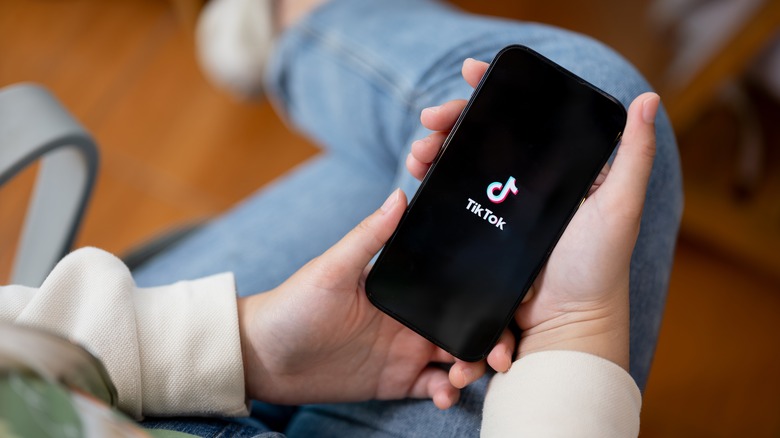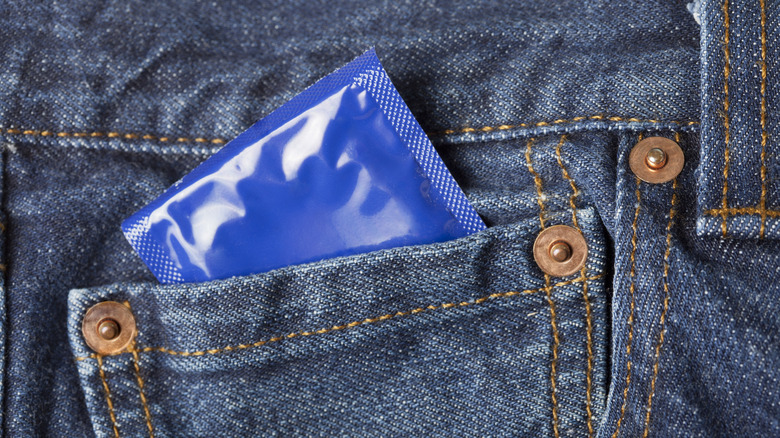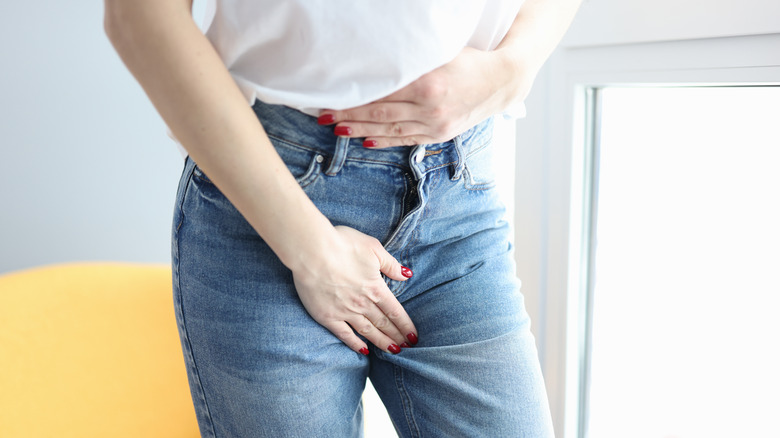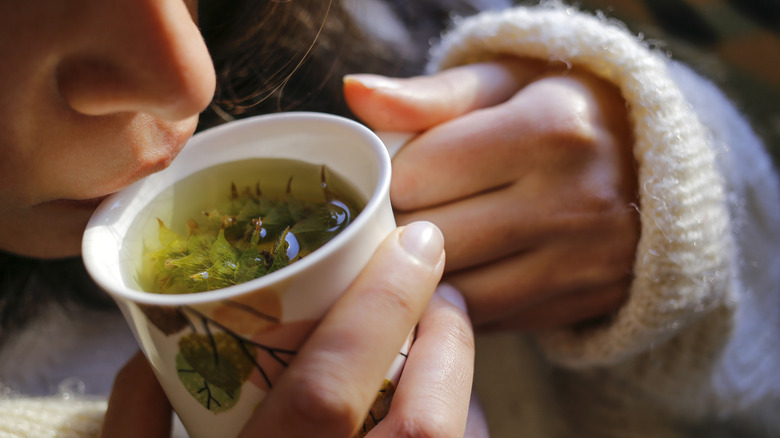Dangerous Sex Myths From TikTok You Should Stop Believing
Trigger warning: This article mentions sexual assault.
Social media outlets like X (formerly known as Twitter), Facebook, and TikTok have become a part of our daily lives. According to 2023 statistics from the University of Maine, nearly five billion people worldwide are on social media, which is more than half of the global population. All told, the stats show that people around the world spend nearly 12 billion hours every day using social media. TikTok, in particular, has seen a massive spike in users in recent years. Wallaroo Media reports that the app boasts more than one billion active users and has been downloaded more than two billion times worldwide.
While these apps can be both entertaining and (occasionally) informative, problems can arise when people begin to take information they hear on social media as being completely accurate. A 2022 study published in the International Journal of Impotence Research showed that, since the COVID-19 pandemic, there has been a 40% to 70% increase in people turning to online platforms for medical information. According to a report from CharityRX, one in five Americans turns to TikTok before seeing a doctor with a health-related question.
Unfortunately, these posts can be rife with misinformation, as evidenced by a 2023 study from the University of Arizona College of Medicine (via EurekAlert!). That study showed that up to 40% of the medical info presented on TikTok proved to be inaccurate. With that in mind, here are a few TikTok myths about sex that you should be wary of.
Sex on your period is dangerous
There are a number of online myths circulating about having sex during menstruation. These can range from it being considered "gross" to having it cause pain, fatigue, and muscle aches. In fact, a 2018 survey from Clue and the Kinsey Institute Condom Use Research Team showed that just 15% of women engage in sexual activity during their periods, while 48% avoid sexual activity involving the genitals entirely. Meanwhile, 41% of women reported that, instead of sex, they focus solely on stimulating their partner during their period.
However, according to Healthline, apart from occasionally being messy, period sex is completely safe, and couples shouldn't worry about having it, provided they are comfortable. For one thing, orgasms may help to relieve menstrual cramping due to the contractions of the uterus muscles and the subsequent release of endorphins. You may also feel your libido increase because of the fluctuation of hormones. Of course, there may be some self-consciousness on the part of the person who is actually on their period. She may feel embarrassed about bleeding or worried that she will leave a mess on the bed. Be sensitive to her concerns and understand if she wants to wait until after her period for sex. But if she is comfortable with it, you both can rest easy knowing that there is no real downside to period sex.
Stealthing is OK during sex
One of the most insidious trends that has popped up online lately is the practice of "stealthing." This involves the male partner discreetly removing his condom during sex without his partner's knowledge or consent. A 2019 study published in Women's Health Issues revealed that 12% of women have experienced stealthing during sex at some point in their lives.
The American Academy of Family Physicians classifies stealthing as a form of sexual assault, and it is currently a crime in California. According to Harley Therapy, stealthing can lead to feelings of guilt and shame, depression, anxiety, mood swings, and issues around trust. Before you and your partner engage in any sexual activity, you have the right to discuss what type of contraceptive you want to use (via the National Domestic Violence Hotline). If at any time the plan around contraception changes, that decision has to be made mutually and consensually. If you feel that your partner may have violated that agreement and engaged in stealthing or another form of abuse, you should seek help immediately.
If you or anyone you know has been a victim of sexual assault, help is available. Visit the Rape, Abuse & Incest National Network website or contact RAINN's National Helpline at 1-800-656-HOPE (4673).
There are drinks to change your vagina's taste
Recently, so-called "kitty cocktails" have become a popular social media trend, with videos on TikTok extolling their supposed benefits. According to these videos, drinking aperitifs made with such ingredients as cranberry, pineapple, and lemons will alter the smell and taste of a woman's vagina. According to The Sexpert, this trend is rooted in harmful stereotypes that have existed related to the smell and taste of the vagina, complete with vulgar fish-centric nicknames.
However, there is no real scientific evidence to support the idea that consuming certain foods or drinks will drastically alter the smell or taste of your vagina (via Popsugar). At the end of the day, experts agree that your vagina should simply smell and taste like a vagina, which can vary from bitter to salty to sweet, depending on the pH balance. According to Medical News Today, you can maintain your vaginal pH balance by refraining from douching or using soap inside the vagina. In addition, you should avoid using feminine hygiene products that are scented, which could increase your risk of a yeast infection and upset the vagina's pH balance.
Caffeine can make your orgasms stronger
Videos on TikTok have been making the rounds claiming that consuming caffeine, particularly coffee, can make your orgasms up to 50 times more intense (via MDLinx). Users have even gone on to corroborate these claims, with one person saying that she experienced a 21-second orgasm after consuming 200 milligrams of caffeine, as opposed to her usual 11-second decaf orgasm. Part of this belief stems from the possible link between caffeine and erectile dysfunction (ED). A 2015 study published in PLOS ONE showed that men who consumed less caffeine were more prone to suffer from ED.
While having a cup of coffee before sex may give you a jolt of energy, MDLinx posits that the intensity of one's orgasm after drinking caffeine may be more linked to a placebo effect than an actual physiological response. Additionally, there could be a risk associated with consuming too much caffeine in pursuit of the perfect orgasm. It can cause greater sexual anxiety and make sleep difficult, which could impede your bedroom prowess in the long term.
Putting ice in your vagina will tighten it
One search for "ice cube challenge" on TikTok will produce some distressing results. This new trend has seen women inserting ice cubes into their vaginas, with claims that the practice can do everything from tightening the vaginal canal to keeping it clean from bacteria. However, experts warn that this trend is potentially dangerous, and can cause injury and even frostbite (via MomBible). The skin of the vagina is very delicate, and a frozen ice cube could stick to it easily, causing damage when it's removed.
In addition to ice, there are a number of supposed experts on social media who claim that inserting everything from garlic to vaginal detox pearls into your vagina will keep it clean. Garlic is not advisable, according to Cool Springs ObGyn, as its oils can irritate the vaginal walls and expose your vagina to bacteria that might be present in the soil. This bacteria could lead to even worse infections, including botulism. Health notes that the vagina is a "self-cleaning" system and doesn't need any extra items to keep it properly maintained.
Vabbing can attract your partner
Women who may be looking to drive their partners wild have been turning to another social media fad known as "vaginal dabbing" or just "vabbing." The practice of vabbing involves using one's own vaginal secretions as almost a form of perfume, applying them to the neck, wrists, and other body parts. The thinking here is that these secretions will act as natural pheromones that can attract someone to you or turn your partner on. And, while the Sexual Health Alliance says that there may be some validity to the notion that humans produce pheromones (and that those pheromones may provoke attraction), there is no conclusive proof that vabbing works. And, on top of that, it's not without its risks.
According to McGill Office for Science and Society, women who insert anything into their vaginas run the risk of infection. If they haven't washed their hands or have long fingernails, they could introduce bacteria into the vagina. In addition, if they have any kind of bacteria or STIs already present in the vagina, they could then transmit that bacteria to wherever they decide to "vab." Speaking to the Daily Mail, gynecologist Dr. Paraskevi Dimitriadi warns that transmitting bacteria into the vagina could lead to pelvic inflammatory disease, causing scarring in the Fallopian tubes and possible infertility. It could also result in diseases of the vagina, such as bacterial vaginosis or thrush.
You can create a DIY abortion cocktail
One of the most baffling and dangerous trends to surface on TikTok is what's known as, among other things, "deletus fetus." This trend has seen a surge in popularity in the United States since the 2022 overturning of Roe v. Wade, and suggests that consuming anything from mugwort tea to high doses of ibuprofen can terminate an unwanted pregnancy (via The Journal). However, the Journal goes on to cite experts who warn that the amount of mugwort tea needed to produce uterine cramping and potentially impact a pregnancy would have to be significant. So significant that it could be incredibly damaging to the kidneys and the liver.
Poison Help warns that the herbs in these supposedly abortion-inducing teas are not held to the same standards as other FDA-approved medications, so there is no way of knowing what all the ingredients are. As a result, there is also no way to be sure how they will interact with other medications that you may be taking. You could experience harmful side effects, including seizures, hallucinations, coma, and even death. If you find yourself unexpectedly pregnant, rather than consulting social media, you should contact your doctor and discuss your options with him or her.
Mucinex-D can boost fertility
This trend is resurfacing again after first appearing in a 1982 study published in Fertility & Sterility. According to that study, 49 women struggling with infertility were given guaifenesin, the active ingredient in Mucinex-D. Twenty-three patients showed improvement in how well their partner's sperm interacted with their cervical mucus and, of those 23, two-thirds became pregnant.
The idea behind this theory is that guaifenesin may help reduce the thickness of cervical mucus, thereby making it easier for the sperm to reach the egg during ovulation (via Health). However, experts say that, during ovulation, the cervical mucus is already thin enough that taking Mucinex-D is unlikely to have a significant impact. Additionally, there could be risks if you're taking Mucinex and you're already pregnant but don't yet know it. A 2021 study published in Epidemiology showed that women who take guaifenesin while pregnant may experience birth defects. The medication is considered a category C risk for pregnant women, meaning there is a definite danger to the fetus. If you are attempting to get pregnant, rather than trying Mucinex, you should first consult your doctor or OB-GYN.
All people enjoy rough sex
Online pornography is currently viewed by 69% of American men and 40% of American women yearly, according to Brigham Young University. BYU also pointed out that one in every eight online pornographic depicted some kind of sexual violence or so-called "rough sex." This exposure to rough sex, including spanking and choking during sex, has trickled over to social media, with the so-called "blackout challenge" becoming popular on TikTok. The challenge involves couples (or even people on their own) choking each other, either during sexual activity or not, until one comes close to passing out.
Choking during sex is very dangerous, as one would expect (via WebMD). It can cause such transient conditions as broken blood vessels in the face or a hoarse voice, or, in extreme cases, it can cause pressure on the carotid arteries and lead to death. Healthline notes that if couples want to experiment with asphyxiation during sex, it's important to be educated about the risks, understand the techniques involved, and to never, ever attempt to do it without both parties fully consenting and respecting each other's limits and boundaries.










